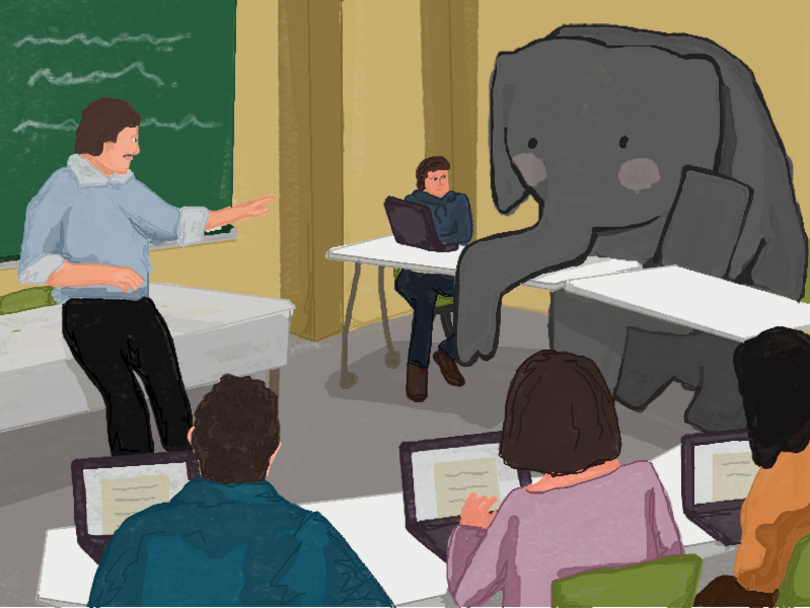Opinion: Accepting taboos as new norm dilutes conversation, personal thought

Our columnist argues a national trend in fear of controversy has permeated Syracuse classrooms, silencing both students and educators. By confronting controversy and speaking up, students can advocate for their freedom to learn. Abby Aggarwala | Contributing Illustrator
Get the latest Syracuse news delivered right to your inbox.
Subscribe to our newsletter here.
Once repression fully roots itself into culture, missed warning signs of the society’s downfall become obvious and regrettable to all its members.
Six months ago, I wrote a column for The Daily Orange arguing that history is a powerful means of combat against the tragic patterns our society is falling into under the Trump administration. Seven months into President Trump’s second round in office, I find his playbook more predictable than ever. But now, the impacts are more impactful than they were before.
The most frustrating element of repression is how it changes our culture in ways we don’t realize. While many of us attempt to push back against the more obvious effects of Trump’s anti-woke agenda or attacks on free speech and protest, there are still sociological impacts when collective moral standards decay.
Often, the practice of repression starts small. In schools, it becomes political for teachers to educate their students by using certain words or referencing specific moments in history. In the press, journalists are name-called and defamed for asking questions and attempting to report with integrity.
But the long-term price of silence is often much higher than that of the discomfort or fear that accompanies fighting corruption through confrontation.Maya Aguirre, Columnist
The effect of the changed dynamic between our government and the institutions most responsible for the free spread of ideas is much more threatening than we’re comfortable admitting in the United States. While censorship is cancerous to society as a whole, it can collectivize in a discriminatory fashion, especially in a society where prejudice is already so prevalent.
When the bystander effect is codified, staying silent becomes frighteningly comfortable for those who aren’t the direct targets of political repression and violence. But the long-term price of silence is often much higher than that of the discomfort or fear that accompanies fighting corruption through confrontation.
Despite being my sixth syllabus week at SU, it was the first time I took more away from what wasn’t said than what was. The conversations held in each of my classes seemed to dance around certain topics, all following a choreography passed down from our federal government.
While discussing DEIA through the lens of fostering an inclusive classroom environment, I watched many of my professors visibly lose self-assuredness as they attempted to select the appropriate, approved language.
However, not all the topics my professors avoided or struggled to address were explicitly prohibited. What once was a single “elephant in the room” became a classroom full of elephants – a classroom full of “if you know, you know” looks, but the lack of courage to verbalize what was behind them.
The fear of retaliation, of being informed on, of losing something because we speak up, has put us all at risk of losing our ability to speak at all.
Even conversations within my classes that did willingly address controversial topics did so rather ironically. For instance, the issue of AI usage kick-started many of my lectures.
While talking about AI, most of my professors took the stance that real human ideas are our most important mechanisms. This mantra seemed inauthentic as I watched them struggle to express themselves under the standards of their superiors.
Fear of controversy is the enemy of learning, but it’s seemingly become the norm in my classrooms.
In feeling the effect of all the words unsaid in class last week, I determined for the first time that a culture of fear has permeated our classrooms in a way that damages the educational experience for both students and educators.
We don’t have the privilege to tiptoe around topics at this point.
In our opportunistic position as students, we hold a responsibility to sound the alarms of corruption as it seeps into our educational spaces before our voices are silenced. This includes combating our changing cultural norms, which implore us to limit our breadth of conversational topics in professional and academic settings, but will extend to all other spheres of our lives.
This is not to say that every conversation we have should be blunt. The most complex part of reactivating our comfort to speak freely is knowing that unchecked hate speech is what causes repression in the first place.
But in taking time to distinguish what topics and thoughts are worth addressing versus what is unhelpful to creating environments where free speech is protected, we regain our power and change the culture we’ve come to accept more and more over the past year.
Maya Aguirre is a senior magazine news digital major. Her column appears bi-weekly. She can be reached at msaguirr@syr.edu.




